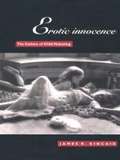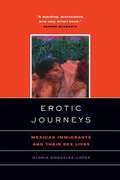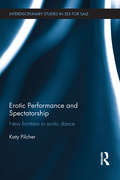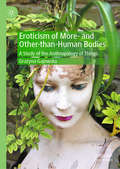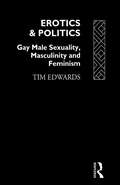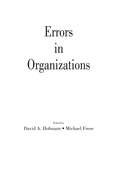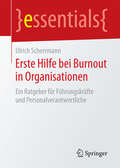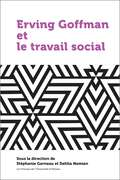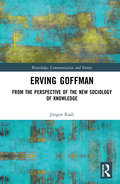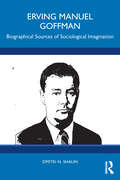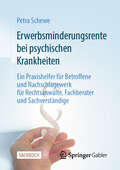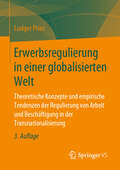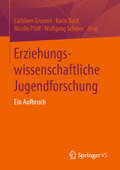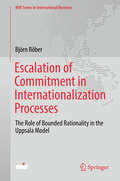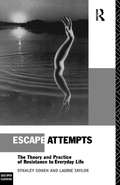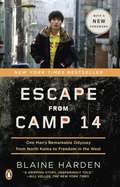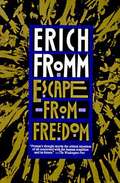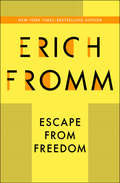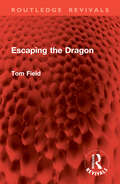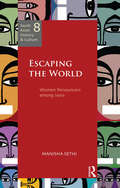- Table View
- List View
Erotic Innocence: The Culture of Child Molesting
by James KincaidIn Erotic Innocence James R. Kincaid explores contemporary America's preoccupation with stories about the sexual abuse of children. Claiming that our culture has yet to come to terms with the bungled legacy of Victorian sexuality, Kincaid examines how children and images of youth are idealized, fetishized, and eroticized in everyday culture. Evoking the cyclic elements of Gothic narrative, he thoughtfully and convincingly concludes that the only way to break this cycle is to acknowledge--and confront--not only the sensuality of children but the eroticism loaded onto them. Drawing on a number of wide-ranging and well-publicized cases as well as scandals involving such celebrities as Michael Jackson and Woody Allen, Kincaid looks at issues surrounding children's testimonies, accusations against priests and day-care centers, and the horrifying yet persistently intriguing rumors of satanic cults and "kiddie porn" rings. In analyzing the particular form of popularity shared by such child stars such Shirley Temple and Macaulay Culkin, he exposes the strategies we have devised to deny our own role in the sexualization of children. Finally, Kincaid reminds us how other forms of abuse inflicted on children--neglect, abandonment, inadequate nutrition, poor education--are often overlooked in favor of the sensationalized sexual abuse coverage in the news, on daytime TV talk shows, and in the elevators and cafeterias of America each day.This bold and critically enlightened book will interest readers across a wide range of disciplines as well as a larger general audience interested in American culture.
Erotic Journeys: Mexican Immigrants and Their Sex Lives
by Gloria Gonzalez-LopezThis is a vivid chronicle of the sex lives of male and female Mexican immigrants in the US that highlights how ideas about sex change after migration to this country.
Erotic Performance and Spectatorship: New Frontiers in Erotic Dance (Interdisciplinary Studies in Sex for Sale)
by Katy PilcherErotic dance is one of the most contentious issues in feminist debates today and a source of fascination in media and popular cultural representations. Yet, why is it that we currently know so little about those who perform erotic dance for female customers, or the experiences of these spectators themselves? The result of a unique investigation within two of the UK’s leisure venues, Erotic Performance and Spectatorship seeks to rectify the aforementioned lack of insight. Through vivid ethnographies of a lesbian leisure venue and a male strip show, Pilcher’s research advances key debates about the gender and sexual politics of erotic dance, whilst simultaneously relating these to debates about the sex industry more widely. This book also subverts previous assumptions that only women perform erotic dance and only men spectate. Thus, this book stands out amongst other academic accounts, developing the debate beyond the established focus on erotic dance as either empowering or degrading. This new contribution to the study of erotic dance – which provides a fresh theoretical perspective combining queer and feminist theorising, in addition to rich empirical evidence – will appeal to academic researchers and both undergraduate and postgraduate students within the fields of sociology, gender studies, sexuality studies, gay & lesbian studies, feminism and other neighbouring disciplines. It will also be of interest to feminist and sex work activists, policy makers, and practitioners.
Eroticism of More- and Other-than-Human Bodies: A Study of the Anthropology of Things
by Grażyna GajewskaFocusing on non-human actors, Grażyna Gajewska expands the discussion of eroticism in contemporary culture by bringing in material culture, object studies, and “the anthropology of things.” She sets out from the assumption that things (such as, for instance, attire, underwear, shoes, or jewelry) play an important role in arousing erotic imagination—they are genuine participants in the process, not mere signifiers of eroticism. Their use does not denote only undeniable facts of everyday life associated with functionality, the pragmatic or aesthetic aspect, but also contribute to the shaping of human emotions, fantasies and phantasms. In her study, Gajewska brings eroticism in contemporary culture to light through applying gender studies to new contexts—animals, robots, virtual worlds—even as she explores a new methodology, the anthropology of things.
Erotics and Politics: Gay Male Sexuality, Masculinity and Feminism (Critical Studies on Men and Masculinities)
by Tim EdwardsErotics and Politics provides an interface between the study of sexuality (particularly gay male studies) and gender (primarily feminism). In doing so it covers a wide range of issues of concern to gay and feminist movements over the past twenty five years including gay liberational sexuality, sado-masochism, pornography, promiscuity, personal relationships, AIDS and postmodernity. The central focus of attention throughout is the nature, development and consequence of gay male sexuality and masculinity. This book is unique in its coverage of a wide range of issues and connecting subjects which are typically examined separately.
Errors in Organizations (SIOP Organizational Frontiers Series)
by Michael Frese David A. HofmannDespite the significance and prevalence of errors in organizations, there has been no attempt within the field of Industrial and Organizational Psychology to create a single source summarizing what we know regarding errors in organizations and providing a focused effort toward identifying future directions of research. This volume answers that need and provides contributions by researchers who have conducted a considerable amount of research on errors occurring in the work context. Students, academics and practitioners in a wide range of disciplines, i.e., industrial organizational psychology, medicine, aviation, human factors and systems engineering, will find this book of interest.
Erste Hilfe bei Burnout in Organisationen: Ein Ratgeber für Führungskräfte und Personalverantwortliche (essentials)
by Ulrich ScherrmannUlrich Scherrmann beschreibt in diesem essential das Burnout-Syndrom, um davon ausgehend die Ursachen anhand eines systemischen Burnout-Modells n#65533;her zu beleuchten. Bisher wird den betrieblichen Ursachen f#65533;r die #65533;berlastung von Mitarbeitenden, den sogenannten organisationalen Faktoren, noch zu wenig Beachtung geschenkt. Es dominieren die personalen Ursachen, z. B. dass Menschen nicht Nein sagen k#65533;nnen oder durch #65533;bertriebenen Ehrgeiz sich selbst ins Burnout man#65533;vrieren. Im Praxisteil stellt der Autor M#65533;glichkeiten der Prophylaxe sowohl f#65533;r einzelne Mitarbeiter als auch f#65533;r F#65533;hrungskr#65533;fte und die ganze Organisation dar. In der Pr#65533;vention wird u. a. auf Gefahren f#65533;r Unternehmen (Musterwiederholung, Pr#65533;sentismus) hingewiesen. Konkrete M#65533;glichkeiten f#65533;r Interventionen runden dieses essential ab.
Erving Goffman
by Tom BurnsDecades after his death, the figure of Erving Goffman (1922-82) continues to fascinate. Perhaps the best-known sociologist of the second half of the twentieth century, Goffman was an unquestionably significant thinker whose reputation extended well beyond his parent discipline.A host of concepts irrevocably linked to Goffman's name - such as 'presentation of self', 'total institutions', 'stigma', 'impression management' and 'passing' - are now staples in a wide range of academic discourses and are slipping into common usage. Goffman's writings uncover a previously unnoticed pattern in the minutiae of everyday interaction. Readers are often shocked when they recognize themselves in his shrewd analyses of errors and common predicaments. This superb study, written by one of the most respected sociologists at work today, is an indispensible guide to the sociology of Erving Goffman. This book offers a compact guide to Goffman’s key ideas and the debates they have engendered, and incorporates understandings generated by recent Goffman scholarship.
Erving Goffman (Key Sociologists)
by Greg SmithDecades after his death, the figure of Erving Goffman (1922–82) continues to fascinate. Perhaps the best-known sociologist of the second half of the twentieth century, Goffman was an unquestionably significant thinker whose reputation extended well beyond his parent discipline. A host of concepts irrevocably linked to Goffman's name – such as 'presentation of self', 'total institutions', 'stigma', 'impression management' and 'passing' – are now staples in a wide range of academic discourses and are slipping into common usage. Goffman's writings uncover a previously unnoticed pattern and order in the minutiae of everyday interaction. Readers are often shocked when they recognize themselves in his shrewd analyses of errors, awkwardness and common predicaments. Greg Smith's book traces the emergence of Goffman as a sociological virtuoso, and offers a compact guide both to his sociology and to the criticisms and debates it has stimulated.
Erving Goffman et le travail social (21e – Société, histoire et cultures)
by Stéphanie Garneau & Dahlia NamianEn ces temps de morcèlement et de cloisonnement disciplinaire, il est impératif de rappeler les liens ambigus, mais néanmoins enchevêtrés, entre le travail social et la tradition sociologique dont est issu Erving Goffman. Les auteurs de cet ouvrage – travailleurs sociaux, sociologues, anthropologues, politistes et infirmiers – ouvrent la « boîte à outils goffmanienne », offrant des regards novateurs sur les enjeux contemporains entourant le travail social. Il prend appui sur une pluralité d’objets, dont la santé mentale, la toxicomanie, les soins aux personnes âgées ou avec un handicap, et l’aide aux sans-abris. Que ce soit sous l’angle épistémologique, théorique, méthodologique ou pratique, la posture goffmanienne est digne de considération. Elle permet d’observer les effets des institutions et des catégories du travail social sur les personnes ciblées. Elle aide à sortir d’une vision normative de l’intervenant pour identifier les possibilités et les contraintes qui pèsent sur lui. Elle permet également d’accéder aux dimensions tacites, affectives et parfois insoupçonnées du social et de la relation d’aide dans le but de rendre visible l’invisible, de rendre intolérable le toléré et les allant-de-soi. Les dix-sept collaborateurs rattachent certaines des ficelles qui ont été dénouées entre les deux disciplines au fil des luttes visant leur reconnaissance institutionnelle.Publié en français
Erving Goffman: From the Perspective of the New Sociology of Knowledge (Knowledge, Communication and Society)
by Jürgen RaabWhile Erving Goffman’s books are among the most widely read sociological works, covering issues including the presentation of the self, total institutions, interaction order to frame analysis, they are in fact guided by a single theme: the analysis of the form of interaction in social situations and the role that individuals play in it. This book stresses Goffman’s central role as a sociological theorist, exploring the potentials of his work and uncovering the recondite layers of his oeuvre. In opening a path to understanding the complexity of his writings, it offers new directions for social theory and empirical research.
Erving Manuel Goffman: Biographical Sources of Sociological Imagination
by Dmitri N. ShalinErving Goffman is the most cited American sociologist. There is no shortage of studies exploring Goffman’s scholarship but no extant biography of Erving Goffman. The chief reason is that a man who looked behind the facades people erect to protect their private selves, zealously guarded his own backstage. This book is the first comprehensive biography of Goffman, an intellectual of Russian-Jewish descent, who turned the “Potemkin village” trope into a powerful research program. The present study shows how key turns in Goffman’s career reflected dramatic events in his family and personal history. It is based on the materials gathered in the Erving Goffman Archives, a repository curated by the author who has been collecting documents and conducting interviews with Goffman’s relatives, colleagues, and friends. The archival work turned up documents which improve our understanding of Goffman the scholar, the teacher, and the man. The approach adopted in this investigation sheds new light on Goffman’s scholarship which has had an enormous and continuous impact across the social sciences and humanities.
Erwerbsminderungsrente bei psychischen Krankheiten: Ein Praxishelfer für Betroffene und Nachschlagewerk für Rechtsanwälte, Fachberater und Sachverständige
by Petra ScheweJede zweite Erwerbsminderungsrente wird auf der Grundlage von psychischen Erkrankungen gewährt. Petra Schewes neuer Ratgeber trägt dem extrem hohen Beratungsbedarf in diesem Bereich Rechnung. Er basiert auf ihrem ersten Buch "Ratgeber Erwerbsminderungsrente" (2017) und fokussiert auf die aktuellen Verfahren der Rentengewährung allgemein sowie deren Spezifika bei psychischen Krankheitsbildern. Der strukturierte Wegweiser unterstützt Versicherte der Deutschen Rentenversicherung, sich im Labyrinth der Voraussetzungen und häufig nicht zu verstehenden Unterlagen der Deutschen Rentenversicherung und medizinischen Gutachten zurechtzufinden und berechtigte Leistungsansprüche durchzusetzen. Zahlreiche Schaubilder und eine verständliche Beschreibung der Abläufe stellen die einzelnen Wege für den Laien klar und übersichtlich dar. In der Sozialberatung dient das Buch als Nachschlagewerk und Arbeitshilfe. Mit Praxisteil, Anlaufstellen und Hilfsangeboten.
Erwerbsregulierung in einer globalisierten Welt: Theoretische Konzepte und empirische Tendenzen der Regulierung von Arbeit und Beschäftigung in der Transnationalisierung
by Ludger PriesArbeit und Produktion sind im 21. Jahrhundert immer stärker grenzüberschreitend vernetzt. Dies galt aber bisher nicht in gleichem Maße für die Regulierung der Arbeits-, Beschäftigungs- und Partizipationsbedingungen der erwerbstätigen Menschen. Nationale Mechanismen und Institutionen dominieren immer noch die Festlegung etwa von Bezahlung, Arbeitszeit, Arbeitsschutz und Beteiligung der Beschäftigten. Bei genauerer Betrachtung zeigt sich eine Vielfalt von grenzüberschreitenden Formen der Festlegung z.B. von Mindeststandards für Arbeit und von Verhaltensregeln für internationale Konzerne. Es entsteht eine transnationale Netzwerktextur der Erwerbsregulierung, die internationale Organisationen, staatliche Akteure, Nicht-Regierungsorganisationen, globale Konzerne, Gewerkschaften und Arbeitnehmervertretungen einbezieht. Der ‚globalisierte Kapitalismus‘ agiert zwar grenzüberschreitend, aber nicht ungebändigt.
Erziehung zur Wut: Eine sozio-epistemologische Analyse des Kleinbürgers (Diversität und Bildung im digitalen Zeitalter)
by David KergelDer Band leistet eine sozio-epistemologische Analyse von Erziehung und den mit der Erziehung verbundenen Subjektformationen. Heuristisch wird die Subjektformation des Kleinbürgers als Manifestation von Erziehungspraktiken analysiert. Methodisch kommt ein transdisziplinärer Ansatz zur Anwendung, der sozio-epistemologische, psychoanalytische, soziologische sowie bildungstheoretische Analysestrategien integrativ zusammenführt. Die vorliegende Studie leistet eine theoriebasierte Analyse der (gesellschaftlichen) Effekten von Erziehung als pädagogische Praxis. Dabei steht eine sozio-epistemologische Auseinandersetzung mit Produktion von Subjektformationen im pädagogischen Kontext im Fokus der Analyse.
Erziehungswissenschaftliche Jugendforschung: Ein Aufbruch
by Cathleen Grunert Wolfgang Schröer Nicolle Pfaff Karin BockDer Band geht der Frage nach, welche aktuelle Bedeutung die Jugendforschung in der Erziehungswissenschaft hat. In den Beiträgen wird diskutiert, wie das Gegenstandsfeld Jugend in der Erziehungswissenschaft aktuell konturiert ist und mit welchen theoretischen und methodischen Zugängen es bearbeitet wird. Darüber hinaus wird untersucht, wie die Jugendforschung in die verschiedenen subdisziplinären Zusammenhänge und nachbardisziplinären Bezüge eingebunden ist und vor welche jugend-, forschungs- und disziplinpolitischen Herausforderungen eine erziehungswissenschaftlich orientierte Jugendforschung aktuell gestellt ist.
Escalation of Commitment in Internationalization Processes
by Björn RöberThis unique book on international business presents a critical review of the role of bounded rationality in internationalization process (IP) research. Corporate internationalization processes have been a subject of scientific debate for several decades. However, it is questionable whether behavioral research insights are sufficiently acknowledged in this academic discipline. Against this backdrop, the author critically assesses the behavioral assumptions of the Uppsala Model, which is commonly considered to be the pivotal approach in internationalization process research.
Escape Attempts: The Theory and Practice of Resistance in Everyday Life (Pelican Ser.)
by Stanley Cohen Laurie TaylorFrom sexual fantasies to holidays this marvellous book charts our escape attempts. In a series of dazzling commentaries the authors reveal the ordinary and extraordinary ways in which we seek to defy the despair of the breakfast table and the office But the book is much more than a first-rate cartography of everyday life. It crackles with important theoretical insights about how `normality' is managed. This fully revised edition contains a superb new introduction, `Life After Postmodernism', which exposes the conceits of the postmodernist adventure and which should be required reading for anyone interested in making sense of everyday life.
Escape From Camp 14: One Man's Remarkable Odyssey from North Korea to Freedom in the West
by Blaine HardenThe heart-wrenching New York Times bestseller about the only known person born inside a North Korean prison camp to have escaped North Korea's political prison camps have existed twice as long as Stalin's Soviet gulags and twelve times as long as the Nazi concentration camps. No one born and raised in these camps is known to have escaped. No one, that is, except Shin Dong-hyuk. In Escape From Camp 14, Blaine Harden unlocks the secrets of the world's most repressive totalitarian state through the story of Shin's shocking imprisonment and his astounding getaway. Shin knew nothing of civilized existence--he saw his mother as a competitor for food, guards raised him to be a snitch, and he witnessed the execution of his mother and brother. The late "Dear Leader" Kim Jong Il was recognized throughout the world, but his country remains sealed as his third son and chosen heir, Kim Jong Eun, consolidates power. Few foreigners are allowed in, and few North Koreans are able to leave. North Korea is hungry, bankrupt, and armed with nuclear weapons. It is also a human rights catastrophe. Between 150,000 and 200,000 people work as slaves in its political prison camps. These camps are clearly visible in satellite photographs, yet North Korea's government denies they exist. Harden's harrowing narrative exposes this hidden dystopia, focusing on an extraordinary young man who came of age inside the highest security prison in the highest security state. Escape from Camp 14 offers an unequalled inside account of one of the world's darkest nations. It is a tale of endurance and courage, survival and hope.
Escape from Freedom
by Erich H. FrommA classic analysis of the problem of freedom, totalitarianism and participatory democracy.
Escape from Freedom: Escape From Freedom, To Have Or To Be?, And The Anatomy Of Human Destructiveness
by Erich FrommWhy do people choose authoritarianism over freedom? The classic study of the psychological appeal of fascism by a New York Times–bestselling author. The pursuit of freedom has indelibly marked Western culture since Renaissance humanism and Protestantism began the fight for individualism and self-determination. This freedom, however, can make people feel unmoored, and is often accompanied by feelings of isolation, fear, and the loss of self, all leading to a desire for authoritarianism, conformity, or destructiveness. It is not only the question of freedom that makes Fromm&’s debut book a timeless classic. In this examination of the roots of Nazism and fascism in Europe, Fromm also explains how economic and social constraints can also lead to authoritarianism. By the author of The Sane Society and The Anatomy of Human Destructiveness, this is a fascinating examination of the anxiety that underlies our darkest impulses, an enlightening volume perfect for readers of Eric Hoffer or Hannah Arendt. This ebook features an illustrated biography of Erich Fromm including rare images and never-before-seen documents from the author&’s estate.
Escape to Freedom: Brave Young Refugees
by Allan ZulloTen true stories of young people who fled violence and oppression in their homelands to seek a better life in the United States.
Escaping Utopia: Growing Up in a Cult, Getting Out, and Starting Over
by Janja Lalich Karla McLarenWe think of cults as bizarre, inexplicable, or otherworldly places that only strange people inhabit, but cults and other abusive and high-demand groups (and relationships) are actually quite commonplace. In fact, the behaviors, social pressures, and authoritarian structures that create cults exist to a greater or lesser extent in every human relationship and every human group. In the first in-depth research of its kind, the author interviewed sixty-five people who were born in or grew up in thirty-nine different cultic groups spanning more than a dozen countries. What’s especially interesting about these individuals is that they each left the cult on their own, without outside help or internal support. In Escaping Utopia: Growing Up in a Cult, Getting Out, and Starting Over, the authors craft Lalich’s original and groundbreaking research into an accessible and engaging book, the first of its kind focusing on this particular population.
Escaping the Dragon (Routledge Revivals)
by Tom FieldFirst published in 1985, Escaping the Dragon is written for anyone- parents, family, friends, teachers, health professionals- who want to know about heroin addiction. Based on the author’s own experience and research, this book details the misuse of heroin with emphasis on the recognition of physical and psychological addiction, the consequences and social effects, and most importantly the first steps, professional help and continuing support necessary to deal with heroin addiction.Escaping the Dragon is essential reading for anyone concerned about, interested in or actively combatting heroin addiction.
Escaping the World: Women Renouncers among Jains (South Asian History and Culture)
by Manisha SethiThe book attends to a historical question — how to account for the high numbers of renouncers (sadhvis) mentioned in medieval and ancient texts — which has been acknowledged and raised, but left unaddressed within Jain studies. It does so through ethnographic data gathered through extensive fieldwork among the sadhvis in Delhi and Jaipur. The volume foregrounds the primacy of ‘choice’ and ‘agency’— upheld by the nuns themselves, who associate asceticism with autonomy, freedom, joy, spiritual well-being, self-worth and peace, and grihastha (household) with loss of independence, fettered existence, degradation, burdensome familial obligations and social responsibilities. It also examines whether it may be apt to term Jain nuns as practitioners of an ‘indigenous mode of feminism’. The book challenges the existing sociological theories of renunciation and tests the feminist concepts of agency and autonomy by investigating the culturally coded roles ascribed to women in Jainism, which are variegated, and examines how a fractured discourse and reality is resolved in the subjectivities and identities of female ascetics. The very legitimacy of the institution of female asceticism, and the way in which the society (samaj) upholds and sustains it, renders female asceticism into a socially approved alternative institution — albeit one that allows Jain nuns to create spaces of relative and autonomy and even prestige for themselves.
